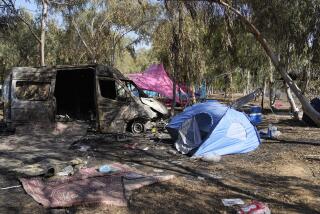U.N. Troops Reportedly Used Brothel Run by Bosnia Serbs
- Share via
SARAJEVO, Bosnia-Herzegovina — U.N. peacekeepers in Bosnia regularly visited a Serbian-run brothel outside Sarajevo, where some of them took sexual advantage of Muslim and Croatian women forced into prostitution, according to Muslim witnesses and the local Serbian commander.
Although the Bosnian government charged repeatedly that Bosnian Serbs had set up a concentration camp at the same site, U.N. peacekeepers neither investigated the facility nor reported its existence to their superiors, according to former prisoners and U.N. officials.
The visits occurred in the summer and autumn of 1992 at Sonja’s Kon-Tiki, a restaurant-pension in Vogosca, about six miles north of Sarajevo, according to 12 Muslim and three Serbian witnesses. A U.N. investigation of alleged black-marketeering and other improprieties by U.N. personnel in Sarajevo has been widened to include these allegations.
Sonja’s gained notoriety following the capture and trial of Borislav Herak, a Serbian soldier who was sentenced to death by the Bosnian government in March for raping and murdering Muslim and Croatian women at Sonja’s during the summer of 1992. Herak testified at his trial that he visited Sonja’s two to three times a week, raping women there. He said he had seen U.N. personnel at Sonja’s once.
According to Branislav Vlaco, the Bosnian Serb commander of the camp from May to November, 1992, U.N. troops were frequent visitors to Sonja’s.
“They came several times a week while I was commandant,” he said. He said they came for food and drinks, to watch television, “and they came for the girls too.”
Vlaco, who later became chief of police in Vogosca, said that as many as 50 U.N. peacekeepers came to visit. The officers were from Canada, New Zealand, France, Ukraine and an African country, he said. A member of the self-styled Bosnian Serb government and a restaurant employee confirmed frequent visits.
Vlaco also ran the detention camp in a half-buried bunker about 150 feet behind the restaurant, where 80 to 100 people, mostly Muslim men, were held in inhumane conditions.
Survivors of the camp interviewed by Newsday reported that in the summer and autumn of 1992, uniformed U.N. troops arrived on U.N. transports and jeeps on six or more occasions and entered the restaurant. On some occasions the camp survivors saw young women being forced into U.N. armored personnel carriers or civilian cars that followed the U.N. vehicles to an unknown destination. Not once did U.N. personnel investigate the bunker, the witnesses said.
U.N. officials at U.N. headquarters in Zagreb, Croatia, declined to comment on the allegations.
More to Read
Sign up for Essential California
The most important California stories and recommendations in your inbox every morning.
You may occasionally receive promotional content from the Los Angeles Times.











